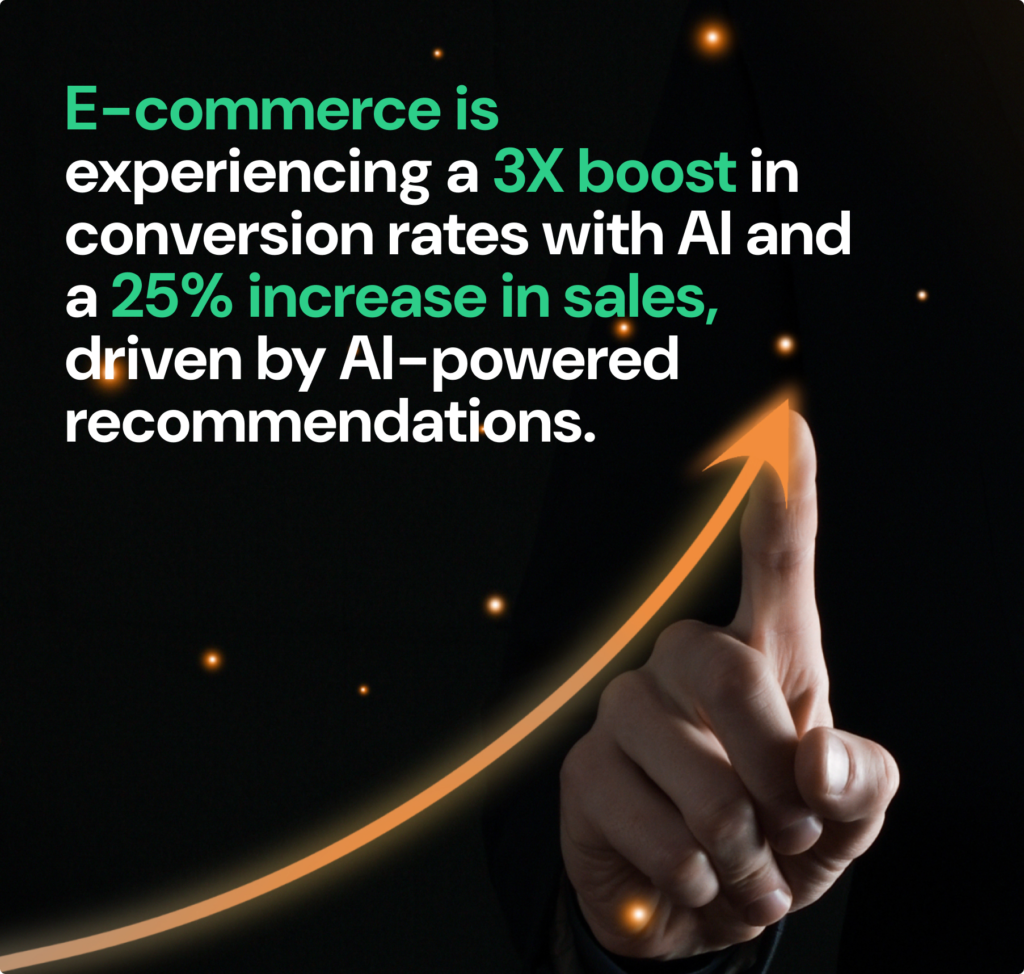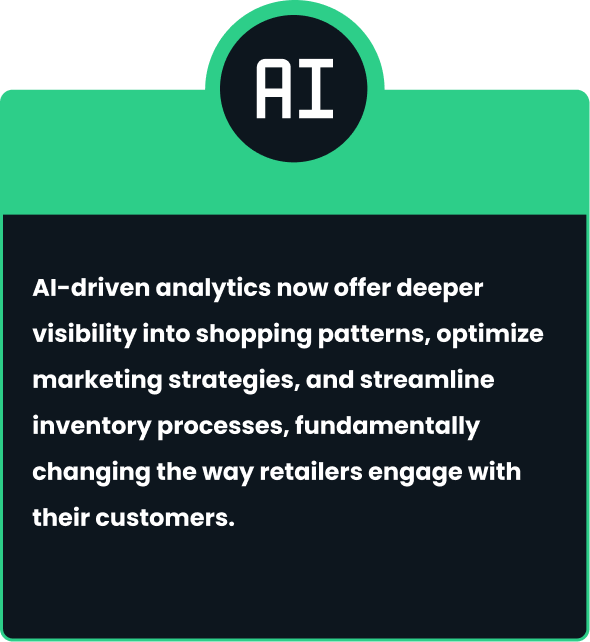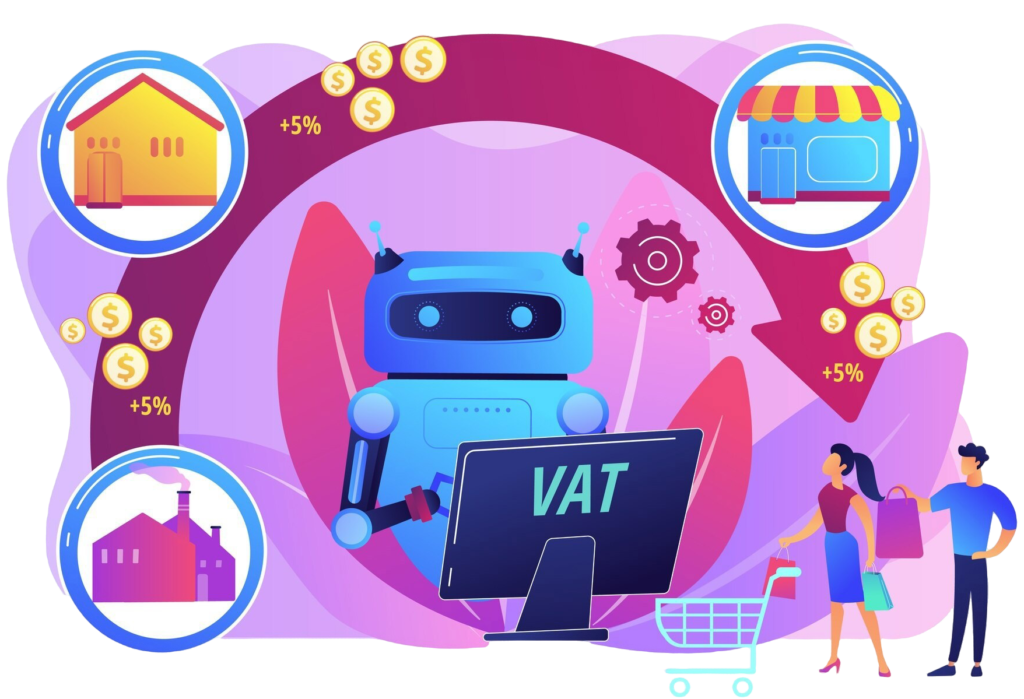The retail sector today faces multiple macro trends that demand an agile, data-driven response—something AI is uniquely positioned to deliver. Customers now expect every shopping journey to feel tailor-made, driving the need for instant, personalized experiences. At the same time, supply chain issues are keeping retailers on their toes, requiring agile responses that only data-driven insights can provide.
And with sustainability on everyone’s mind, brands are turning to AI to shrink their footprint and show customers they’re serious about green. In a space where marginal gains can make the difference between winning and losing market share, the companies that integrate AI effectively will set themselves apart from competitors that rely on outdated processes and less agile strategies.
What AI Means for E-commerce?
More businesses are hopping on the AI bandwagon, with adoption rates grown by 270% since 2019. Artificial Intelligence (AI) is often mentioned across various industries, yet its full scope is not always well understood. In the context of e-commerce, AI encompasses a range of technologies such as machine learning (ML), predictive analytics, and natural language processing (NLP). These technologies work together to collect, process, and analyze massive amounts of data, turning it into valuable insights that enable retailers to make precise, data-driven business decisions.
For instance, machine learning algorithms can analyze purchasing patterns, while predictive analytics models can forecast demand, helping businesses optimize inventory levels. AI can even operate autonomously, leveraging advanced analytics to transform raw data from sources like IoT devices and customer interactions into actionable insights that drive efficiency and growth.

AI’s reach extends beyond operations—behavioral analytics and customer intelligence tools help retailers understand and predict consumer behavior, allowing for hyper-targeted marketing strategies.
Where Does Data Fit in?
While data has always played a key role in retail decision-making, the true potential is unlocked when AI works in tandem with a strong data foundation. By shifting from fragmented data storage to a unified, cloud-based infrastructure, retailers can fully leverage AI’s power.
This transformation enables businesses to generate actionable insights on customer behavior, marketing effectiveness, and inventory management. AI-driven analytics now offer deeper visibility into shopping patterns, optimize marketing strategies, and streamline inventory processes, fundamentally changing the way retailers engage with their customers.

AI Use Cases in Retail and E-commerce
Below are keyways in which AI is reshaping retail and e-commerce:
1. Personalized Shopping Experiences
AI-driven algorithms analyze customer behavior, purchase history, and preferences to offer highly personalized recommendations.
- Generative AI: Retailers like Amazon utilize generative AI to enhance customer experiences through tailored product recommendations and personalized marketing messages, increasing conversion rates.
- Tailored Marketing: AI analyzes customer behavior to create customized email campaigns and advertisements, making marketing more relevant to individual consumers.
2. Chatbots and Virtual Assistants
AI-powered chatbots are revolutionizing customer service in retail and e-commerce by providing instant responses to customer queries and assistance throughout the shopping experience. These virtual assistants:
- Reduce response time, offering 24/7 support.
- Enhance user experience by resolving common queries without human intervention.
- Help in the order process, tracking, and resolving complaints.
3. Visual Search and AI-Powered Product Discovery
AI allows customers to search for products using images rather than keywords, a growing trend in fashion and lifestyle industries. Visual search engines, powered by machine learning algorithms, allow users to:
- Upload an image of a product they want to find.
- Receive recommendations based on image patterns, colors, and styles, streamlining the shopping experience.
4. Inventory and Supply Chain Optimization
AI predicts product demand and enhances inventory management. Companies like Unilever use AI to track and optimize supply chains for sustainability, identifying eco-friendly options to appeal to environmentally conscious consumers.
- Predict product demand using data on sales, market trends, and seasonality.
- Reduce overstock and stockouts through real-time monitoring of inventory levels.
- Optimize logistics and shipping processes by determining the most efficient routes and methods for delivery.

5. Dynamic Pricing
AI models track market conditions, competitor pricing, and customer behavior to implement dynamic pricing strategies in real-time. Retailers can adjust prices based on demand, seasonality, and competition, ensuring:
- Competitive pricing to attract more customers.
- Maximized revenue through data-driven price optimization.
6. Fraud Detection and Prevention
AI algorithms help e-commerce platforms detect fraudulent activities by analyzing transaction patterns and identifying anomalies in real-time. This helps:
- Reduce chargebacks and protect merchants from fraudulent purchases.
- Enhance the trustworthiness of the platform, boosting consumer confidence.
7. Augmented Reality (AR) and AI Integration
AR-powered virtual try-on features are becoming more common in e-commerce, especially in the fashion and furniture industries. Combined with AI, these technologies allow customers to:
- Virtually try on clothes, shoes, or makeup before making a purchase.
- Visualize how products like furniture or decor will look in their home environment.
- Make more informed purchasing decisions, leading to higher satisfaction and reduced return rates.
8. Customer Data Analytics and Insights
AI processes vast amounts of customer data to generate actionable insights, enabling retailers to:
- Understand customer behavior, preferences, and pain points more accurately.
- Predict emerging trends, allowing retailers to adapt to changing demands quickly.
- Make data-driven decisions regarding marketing strategies, product development, and inventory planning.
What is Holding Businesses Back?
As retailers and e-commerce businesses accelerate efforts to build or modernize intelligent applications with generative AI, many are discovering significant gaps in their tech-stack modernization. When exploring and testing AI use cases, these gaps become more apparent, revealing obstacles that hinder progress.
Main challenges are high implementation costs, lack of quality data, complex integration with existing systems, talent shortages, resistance to change, regulatory concerns, and unclear ROI.
However, a recent Microsoft-commissioned study by Forrester Consulting examined modernization efforts across global organizations. Nearly 90% of decision-makers claimed to have a modern tech foundation that’s future-ready. However, the study also uncovered a “perception gap”—many organizations are not as prepared as they believe. A substantial number still rely on rigid, outdated, and legacy systems that limit innovation and flexibility, leaving much room for improvement.
This issue often stems from a cloud migration strategy that focuses solely on moving systems to the cloud. While cloud migration can provide immediate benefits, true modernization goes far beyond a simple lift-and-shift—it’s about leveraging AI and advanced capabilities once systems are in the cloud.
The study also revealed that successful organizations share several common traits: they’ve
- established clear AI-driven technology strategies,
- integrated analytics with measurable business outcomes, and
- upgraded their tech stacks through strategic partnerships with key suppliers.
By following these best practices, they can quickly address internal gaps and rise above challenges on their path to modernization.
What to Expect in the Coming Years?
The future of AI in retail and e-commerce promises exciting trends centered on sustainability, automation, and enhanced customer engagement. AI will drive eco-friendly practices by optimizing energy use and improving supply chain efficiency. The concept of cashier less stores is gaining momentum. Retailers like Amazon Go are pioneering this trend, enabling customers to shop seamlessly without waiting in line. By utilizing smart cameras and sensors to track purchases, these stores enhance convenience while minimizing operational costs, setting a new standard for consumer experiences. Additionally, as consumer expectations rise, AI will enable increased transparency, hyper-personalized experiences and faster services, setting new standards in the industry.
Know If Your Tech Stack is Ready for AI
Are you looking for best practices to guide your modernization journey and unlock the full potential of your technology investments?
Adopting AI in retail may seem daunting, but it doesn’t have to be. With a trusted technology partner like Celestial Systems, you’ll receive expert guidance and support at every stage of the process, from strategy to implementation and beyond. Reach out to us to learn more about how we can help you unlock the full potential of AI for your retail business.

